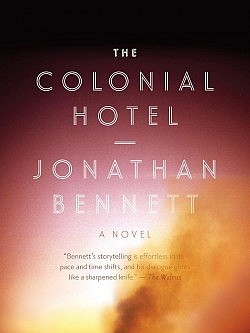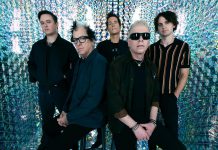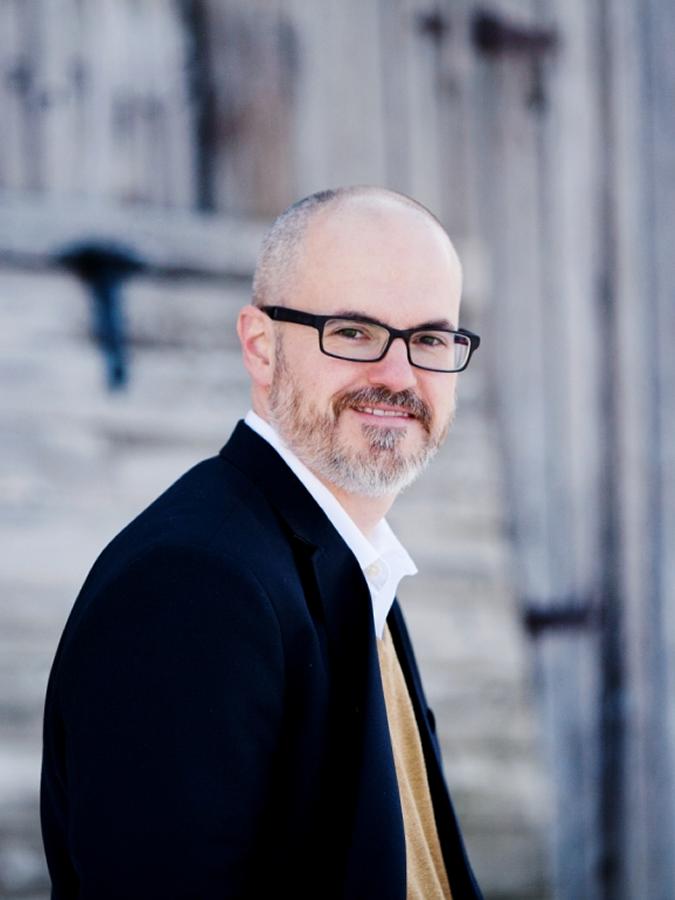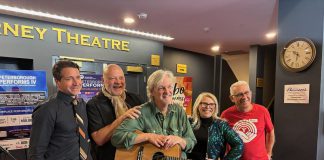Jonathan Bennett is the author of six books including the critically acclaimed novels Entitlement (ECW, 2008) and After Battersea Park, and is a winner of the K.M. Hunter Artists’ Award in Literature. Jonathan’s writing has appeared in many periodicals and journals including The Globe and Mail, The Walrus, Quill and Quire, This Magazine, and Descant. Born in Vancouver and raised in Sydney, Australia, Jonathan lives in the village of Keene, near Peterborough, Ontario.
Jonathan’s latest novel is The Colonial Hotel. In this powerful story of love and family, a doctor named Paris follows a nurse to a country on the brink of civil war. When a confrontation does break out, they are swept up by rebel forces and separated. The nurse, Helen, is pregnant; she escapes, but Paris is left behind, imprisoned by rebels as war rages. Drawing from the story of Paris, Helen, and Oenone in Greek mythology, it’s a narrative of brutal power but also of parental bonds, forgiveness, and identity.
The Colonial Hotel has been praised by critics. The National Post writes that it’s “a rewarding and intensely moving read”. The Winnipeg Free Press describes it as “a compelling, lyrical novel of love, suffering and reconciliation”.
The Globe and Mail states “We are in Graham Greene territory” and The Guelph Mercury effuses that the book is “at once lyrical and brutal, alluring in its spare, elegant prose and shocking in its honest portrayal of the realities of political corruption and duplicitous leadership. Bennett is able to demonstrate the timelessness of the themes of the original classic story in this contemporary setting, offering both emotional depth and universal truths about the human condition.”
You can buy The Colonial Hotel at Amazon (hardcover and Kindle ebook) and at Indigo (hardcover and Kobo ebook). Find out what readers think about The Colonial Hotel on Goodreads.
The Colonial Hotel was published in May 2014 by ECW Press.
PART ONE: PARIS & HELEN
Since my eyes have been outraged by your letter,
there is now no glory in silence.
– Ovid, Heroides, XVII: Helen to Paris
Paris

The bones of the city’s architecture were European. The last half-century had seen makeshift shops and houses rise or fall-the new growing next to, or over the top of, the old. From my seat in the hotel’s café I saw bullet holes in the façades, bills advertising local music or foreign films alongside party propaganda posters. The few recently constructed buildings had corrugated metal roofs with walls of cinderblock. The trees in the park across the road were stumpy with dull-coloured leaves, except the ones that bore the orange-red, sweet fruit-the name of which I never learned.
My daughter, can you see me sitting there easily enough? Can you imagine how the sun warmed my face while I read the local English-language newspaper? I remember that morning exactly, the diesel smell, a lizard climbing the wall of the hotel, the bougainvillea, the feel of the damp paper in the humidity.
I found foreign newspapers beguiling. The words before me on the page were the same ones I’d always known. They meant what they always had. Yet here, just as in the other countries where I’d practised medicine, I had expected historical hatred and the cycle of revenge between opposing political factions to be obvious. Isn’t that the story we’ve come to know? But where was the evidence? If there were signals on the street corners or in the newsprint before me, they were coded in signs meant only for the locals. Or was I blind?
I had pursued Helen through a growing list of poor countries. They were maimed by war, plagued by acts of God. Some were simply lost regions, having been renamed, split, joined, or annexed from our global mind. As part of a team of freelance clinicians we provided medical aid. Helen and I landed on improbable airstrips, climbed into ancient jeeps. Our team would wait whole days at dusty, hot bus terminals, find ourselves eating or drinking in dank establishments with worn-felt pool tables and local men looking for work, or drink, or women. Our safety was always at some risk. We were obvious and exposed. But despite this there was the rush of constant movement, of oncoming newness. The repetitive and rapid deployment produced in me a numbness to specific locations. The newspapers from each of these countries, when published in English, bled together over time to read as one bleak story, one political struggle, one act of poverty.
They weren’t of course. They all differed, in ways major and minor. My daughter, admitting this to you now doesn’t please me. I think that Helen and I were just too easily attracted to this organization. It was filled with devoted clinicians. We cared only about saving lives. So we chased the fatalities from the next roadside bomb, famine, drought, outbreak, or flood. As medical personnel we were overeager to attempt dramatic interventions on the all-but-dead, the pulled-out bodies, the blown-apart, and too-seriously diseased. We were often ill-equipped and, it seemed to me, inexperienced.
On whose authority did we operate? For many of my colleagues, it was God’s work. A simple, discrete answer for everything. Helen’s faith guided her. In this way, she led me.
Yet, from the beginning I struggled. There was often no one left to stay and provide follow-up care, to ensure these lives were worth living. Our group worked around the clock, urging each other on, treating in the midst of gunfire, betting bluff against the very real circumstances. We moved on and left the pain management, the healing, the aftermath, to God, or chance, or maybe both.
That morning in the Colonial Hotel’s café I had opted for coffee. While I had developed a taste for Fanta — seemingly always available and safer than local water — this place was upscale and reserved for foreigners. Helen and I were drawn to its luxuries a second time, as respite from what we had witnessed in the camp. I savoured a good coffee. There were, from time to time, these recuperative days when Helen and I would take a room in as nice a hotel as a place had to offer, and hole up. I would shave, wash, and scrape myself clean. I would launder, or even buy a dress shirt if I could, doing the buttons up casually. I would read a local newspaper.
It was time off and a chance to look the other way, or else pause and feel momentarily righteous about ourselves. Yes, my daughter, we did lapse into self-congratulation. When Helen would comment on how I had diagnosed this or acted quickly to save that, the world dissolved around me. I had never felt stronger, more powerful, in all my life. The absolute right of religion, when delivered by the likes of Helen, made me feel immortal.
That morning, and the events that followed, happened years ago. Memory is an unpredictable and inaccurate shot, but I will aim to set this down honestly for you. I will also try to protect those who committed crimes during the war — or those who did nothing to prevent them — by changing their names. I must leave this country as unidentifiable as I can, to spare everyone here the indignity of having me record their struggles in a language they don’t use. This isn’t evidence. I’ll leave justice, or reconciliation, for other people.
My purpose is simple. This is my story, that’s all. I want to write it out for you, my daughter, to have and to keep.
My name is Paris. I am forty-three years old. I was a physician. I live in this hillside village. I am dying.
I recall a conversation that Helen and I had had the evening before, how everyone was talking about the rainy season being in the air.
Where else would it be, she’d laughed.
On the main street, the original buildings still stood and had been mostly kept up, housing a foreign development bank and an outpost of the government’s agriculture department. I’d said to Helen that I’d half expected to see some throwback colonial administrator with a waxed moustache come striding out from the arched promenade wearing jodhpurs.
This isn’t a movie set, she’d said, plainly. Helen was like that — lighthearted one minute, serious the next.
A café au lait please, and a brioche, I told the server. While I waited, I saw two half-dead dogs, ribcages heaving, tongues lolling, hunting hopelessly for food. One had blood caked onto its hind leg. The morning damp was keeping the dust down at least. I remember these details easily. These are hours I have replayed many times, searching my memory for scraps I might have missed.
There Helen was across the street, talking to a vendor who sold leather goods, belts and wallets.
Daughter, you might rightly ask how we could reconcile enjoying such pleasure given its close proximity to the human suffering found in the camps that we had just left behind. The answer, as I saw it then, was that we were not at this work for the short term. We purchased our way out from underneath the poverty that weighed down this country, and all countries like it, to remain sane and safe. It was essential for us to continue at this work month in, month out.
Helen and I had come to accept our station in these places. Staying at the only affluent hotel was expected. To forgo the status and safety it afforded would be to risk becoming, or appearing to become, a political player. Even if creating political change was morally right, doing so would have placed us in danger. Our reasons for being there were medical. We treated only the effects.
The gaps in this logic seem larger to me now.
As a nurse, Helen took the dangerous assignments seriously and willingly. She went deep into whichever continent needed her, as determined by others at our organization’s headquarters. As a physician, my skills and knowledge were in demand — but in truth I had little driving me other than the desire to follow Helen.
Daughter, I hope you don’t think of me as too simple.
Helen was haggling for something — perhaps a present for me? I admit to hoping so. I returned to the smell of newsprint, adopting an absorbed expression once I saw her approaching.
Why do you always sit in the sun? Helen asked. She smiled faintly. You’re like an old dog. Her eye caught sight of the lizard climbing farther up the wall.
She had bought a suede bookmark and pulled out a paperback, slipping it inside. Her lip curled in the way it did when she was thinking. She was effortlessly beautiful. Her arms were tanned and strong from the work, especially the recent long days at the camp. All that water we’d carried. Had the three peacekeeping soldiers not arrived, would we still have been treading that path to and from the truck, water sloshing out of discarded gasoline canisters? She had on her travel outfit, the blue jeans and slim white T-shirt. She was readying to leave here. From her pocket Helen pulled a printout of an email that she’d just received from a colleague who’d been reassigned several weeks back. The printer paper was the old kind, with the perforation and small holes down each side.
We need you badly here, she read aloud. It’s worsening each day. We are getting no sleep. See if they will transfer you and Paris — some of the other girls too. I could tell by the tone of her delivery that Helen was feeling the lure of new work, a different, equally unmanageable, horror. Please ask Paris to lean on the organization, pressure the executive director.
She looked at me, not needing to ask again in her own words, knowing I would oblige. Even here, the medical hierarchy lives, a physician’s influence can tip the balance of any set of scales.
May I have some? Helen asked, and broke off a piece of brioche.
I bought it for you, I said.
At the next table was a woman I had not seen before. I remember her easily. But why? Her face, haircut, mannerisms? She applied lipstick, looked at herself in a compact mirror and snapped it closed impatiently. Helen did not wear makeup. Brushing her hair and washing her face were all she required.
How is your leg? I asked Helen. I had put four stitches in her thigh at the camp the previous week. She’d cut herself on the tailgate of a truck. I’d boiled water to wash out the cut then sutured it as she sang her national anthem through clenched teeth. She gave up on the singing and did not cry but rather moaned in guttural bursts of controlled pain until I’d finished. No infection developed. What were the chances?
Before I began this work with Helen I’d had just a few years behind me working as an emergency department physician. I’d been following no path beyond paying off student loans, still enjoying my unencumbered authority as a doctor both at and away from the hospital. I turned my back on that life when I fell in love with Helen.
Across the café, expatriates were seated in clusters. A few were aid workers we knew, or knew of, or else they were bank employees, or with the oil company that was test drilling in the country’s north. Each read or wrote postcards, or laughed together in the bright and familiar vernacular of home, or daydreamed in silence, or ate and drank having just returned from work, or greedily sought news of the next flight out or details of who might be arriving on the next one in.
The sun was on Helen’s skin too. It was on her face. She smiled then. It lit her light brown hair.
Let’s go down to the capital tomorrow, Helen said.
We should get a bus, I said. I’ve heard the road the trucks use through the southern mountains is not safe for cars.
If you like, she said. Paris, she added, I was sick again this morning.
Can I do anything?
We had been back and forth — the capital on the South Coast, to this town, then to the camp — only to retrace our steps several times now. That morning, on the only computer in the hotel, I’d waited as it dialled up a connection. I had quickly typed an overdue letter, then emailed it off. I’d finally ended my leave-of-absence from the hospital to do humanitarian work by resigning outright. It was inconceivable that I would ever leave Helen.
We talked properly then. Helen spoke of missing a number of the camp children — the loneliest ones she spoke of by name. I saw that our departure was not just due to the pull of a new assignment. Helen needed to get farther away. If she stayed she would become too attached. She knew she must stave off that ache to give more to those she’d already nursed so intimately. The ache happened when she stopped, when she could think. If she didn’t leave today, tomorrow she would be aboard a morning convoy, back into the camp’s dusty mouth — an open mouth of sores, silent, rotting, and dry from months of screaming.



























